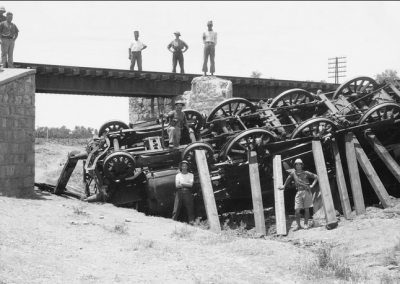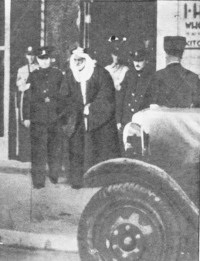Pages in Section 7

The Army Takes Over
ii. The Irgun retaliate
iii. The Army takes over
iv. Tegart's Wall
v. Wyngate's Night Squads
vi. Arabs capture Old City
vii. White Paper
viii. Assassination of Inspectors Ralph Cairns & Robert Barker
ix. 1939 Jewish Political Scene
 Terrorist bombings increased. Every day Arabs and Jews were killed and maimed indiscriminately. Railways, traffic and Jewish settlements were attacked. The oil pipeline from Iraq to Haifa was blown up every week.
Terrorist bombings increased. Every day Arabs and Jews were killed and maimed indiscriminately. Railways, traffic and Jewish settlements were attacked. The oil pipeline from Iraq to Haifa was blown up every week.
In 1937 the two Divisions of the British Army, stationed in Palestine, increasingly took charge from the police and civil authorities. Violence continued throughout 1938. In July, 1938, when the Palestine Government seemed to have largely lost control of the situation, the garrison was strengthened from Egypt despite the need to hold back troops for a possible European war restricted what the army could do.
The Munich settlement in September 1938, however, freed it from this constraint, enabling Britain to send strong reinforcements to Palestine.
In October The police were placed under the operational control of the new army commander, Major-General Bernard Montgomery. Military officials superseded the civil authorities in the enforcement of order. Despite this, the Arab campaign of murder and sabotage continued and Arab gangs in the hills took on the appearance of organized guerrilla fighters.
 Miss Newton of Mt Carmel was one of the few civilians, apart from journalists, allowed to attend the first the first post-war military court hearing in Palestine. She walked through Kingsway, a wide modern boulevard built on land reclaimed from the sea in 1933. That day, November 1937, the road was lined with armed Palestinian police. On reaching re No 61, she found it guarded by British Palestine Police keeping all civilians except for journalists at bay but such was her reputation in Haifa, they let her in. The man on trial was 82 year-old Sheik Farhan es-Sa'adi, who had played a leading role in the 1929 riots and been a loyal follower of al Qassam in the 1935 rebellion. He was accused of being the leader of the gang shooting the three Jewish civilians dragged off an Arab bus in 1936, the first time weapons had been used in the 1936 revolt. The military court found the Sheik guilty and sentenced him to death. He was executed soon after but the police could not understand why the military had to run the trial when a civilian court would have reached the same conclusion.
Miss Newton of Mt Carmel was one of the few civilians, apart from journalists, allowed to attend the first the first post-war military court hearing in Palestine. She walked through Kingsway, a wide modern boulevard built on land reclaimed from the sea in 1933. That day, November 1937, the road was lined with armed Palestinian police. On reaching re No 61, she found it guarded by British Palestine Police keeping all civilians except for journalists at bay but such was her reputation in Haifa, they let her in. The man on trial was 82 year-old Sheik Farhan es-Sa'adi, who had played a leading role in the 1929 riots and been a loyal follower of al Qassam in the 1935 rebellion. He was accused of being the leader of the gang shooting the three Jewish civilians dragged off an Arab bus in 1936, the first time weapons had been used in the 1936 revolt. The military court found the Sheik guilty and sentenced him to death. He was executed soon after but the police could not understand why the military had to run the trial when a civilian court would have reached the same conclusion.
Police resentment of the Army's attitude towards civilians is encapsulated in a speech addressed to an army officer and put into the mouth of a senior policeman by Bernard Ferguson in his book, "The Trumpet in the Hall*:
"It is all very well for you bloodthirsty young fellows coming out here looking for a scrap. You come out for two or three years - and come on, confess it! - you rather look forward to being shot at in an ambush or something. But I am a Police Officer. I chose a profession in which I looked forward to maintaining law and order, to being the father of my people, to stop people being murdered, to keep the peace, to encourage people to come and tell me what is up,so I can look after them."